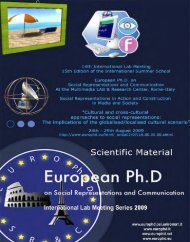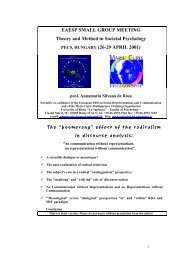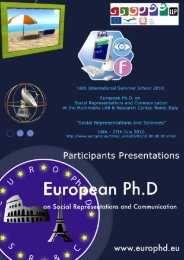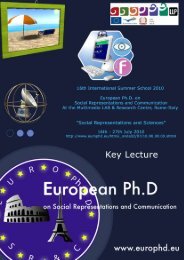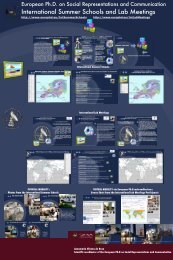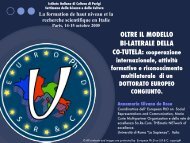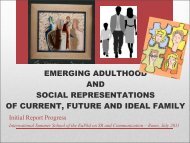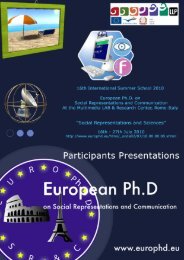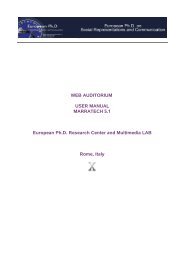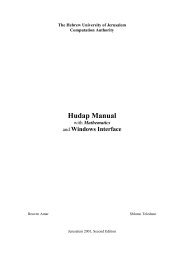The formaTion of scholars: reThinking docToral educaTion for The ...
The formaTion of scholars: reThinking docToral educaTion for The ...
The formaTion of scholars: reThinking docToral educaTion for The ...
Create successful ePaper yourself
Turn your PDF publications into a flip-book with our unique Google optimized e-Paper software.
<strong>The</strong> Formation <strong>of</strong> Scholars<br />
rethinking doctoral education <strong>for</strong> the twenty-first Century<br />
About the Carnegie Initiative on the Doctorate<br />
the 1990s saw several blue-ribbon commissions and sponsored research reports that <strong>of</strong>fered<br />
recommendations to make doctoral education more effective. in their wake it seemed timely<br />
to move from talk to action, and so the Carnegie foundation <strong>for</strong> the advancement <strong>of</strong> teaching<br />
partnered with the atlantic Philanthropies to undertake a five-year project called the Carnegie<br />
initiative on the doctorate, or the Cid. the initiative, which ran from 2001 through 2005, was<br />
designed to be both an action project and a research project. its objective was to support selected<br />
academic departments’ ef<strong>for</strong>ts to improve the effectiveness <strong>of</strong> their doctoral programs. the project<br />
invited participating departments to create local solutions suited to what they themselves identified<br />
as their needs and problems. the project involved eighty-four Phd-granting departments in six<br />
fields—chemistry, education, english, history, mathematics and neuroscience.<br />
over the five years <strong>of</strong> the program, participating departments made a commitment to examine<br />
their own purposes and effectiveness, to implement changes in response to their findings, and to<br />
monitor the impact <strong>of</strong> those changes. Many used their participation to continue plans and activities<br />
that were already begun but would benefit from the structure, prestige and interaction provided by<br />
a national initiative. Carnegie’s role, in turn, included visiting the departments, interviewing campus<br />
team members, and bringing project participants together (sometimes by discipline, sometimes<br />
by theme) to report on their progress, to learn from one another, and to help make sense <strong>of</strong> their<br />
experiences in ways that others can build on. in addition, both faculty and students participated<br />
in project-wide surveys, the results <strong>of</strong> which served as rich grist <strong>for</strong> discussion and debate about<br />
the preparation <strong>of</strong> <strong>scholars</strong> in the broadest sense, whether they work in industry, government or<br />
academe.<br />
About the Authors<br />
george e. Walker is Vice President <strong>for</strong> research and dean <strong>of</strong> the university graduate school<br />
at florida international university. from 2001 to 2006, he served as senior scholar and director <strong>of</strong><br />
the Carnegie initiative on the doctorate.<br />
ChriS m. golde is associate Vice Provost <strong>for</strong> graduate education at stan<strong>for</strong>d university. from<br />
2001 to 2006, she served as senior scholar and research director <strong>for</strong> the Carnegie initiative on the<br />
doctorate.<br />
laura JoneS is director <strong>of</strong> Heritage services and university archaeologist at stan<strong>for</strong>d<br />
university. she was a senior scholar and the director <strong>of</strong> the Community Program at the Carnegie<br />
foundation from 2000–2006.<br />
andrea Conklin BueSChel is senior Program <strong>of</strong>ficer with the spencer foundation.<br />
she <strong>for</strong>merly served as research scholar with the Carnegie foundation.<br />
PaT huTChingS is Vice President <strong>of</strong> the Carnegie foundation <strong>for</strong> the advancement <strong>of</strong> teaching.
A P U B L I C AT I O N O F<br />
H IGH LIGHTS FROM<br />
the <strong>for</strong>mation<br />
<strong>of</strong> <strong>scholars</strong><br />
reThINkINg dOCTOrAL<br />
edUCATION FOr <strong>The</strong> TweNTy-<br />
FIrsT CeNTUry<br />
george e. walker<br />
Chris M. golde<br />
Laura Jones<br />
Andrea Conklin Bueschel<br />
Pat hutchings<br />
FOrewOrd By<br />
Lee s. shulman
“<strong>The</strong> best doctoral programs attempt to discover the ‘sweet<br />
spot’ between conservation and change by teaching skepticism<br />
and respect <strong>for</strong> earlier traditions and sources while encouraging<br />
strikingly new ideas and courageous leaps <strong>for</strong>ward.”<br />
–Carnegie President Lee S. Shulman
Introduction<br />
HIGHLIGHTS<br />
some 375,000 men and women are pursuing doctoral degrees in institutions <strong>of</strong> higher education in the<br />
United states. Over 43,000 will graduate this year. Many <strong>of</strong> those who receive Phds will assume positions <strong>of</strong><br />
leadership and responsibility in arenas that directly shape the lives we lead. Phds develop life-saving medical<br />
interventions, shape social programs and policies, and turn their talents to entrepreneurial ventures in the<br />
global economy. Approximately one-half <strong>of</strong> those who receive doctorates this year will join the ranks <strong>of</strong><br />
college and university faculty who educate today’s undergraduates in the United states and beyond, shaping<br />
the futures <strong>of</strong> our children and grandchildren. And some will prepare new Phds, so the effects <strong>of</strong> doctoral<br />
education ripple out across nations and generations. <strong>The</strong> importance <strong>of</strong> doctoral education to this country’s<br />
current and future prospects can hardly be overestimated. <strong>The</strong> question is: what will it take to ensure<br />
the U.s. continues to be, as many have observed, “the envy <strong>of</strong> the world”? what will it take to meet the<br />
challenges that doctoral education faces today and to make the changes those challenges require?<br />
some <strong>of</strong> the challenges are long standing and well known. About half <strong>of</strong> today’s doctoral students are lost to<br />
attrition—and in some programs the numbers are higher yet. Those students who persist <strong>of</strong>ten take a long<br />
time to finish and along the way find their passion <strong>for</strong> the field sadly diminished. Many are ill-prepared <strong>for</strong> the<br />
full range <strong>of</strong> roles they must play, be it in academe or beyond, and <strong>of</strong>ten the doctoral experience is marred by<br />
a mismatch between the opportunities available to students as they complete their work and their expectations<br />
and training along the way. And in most disciplines, women and ethnic minorities are still underrepresented<br />
among doctoral students.<br />
what makes all <strong>of</strong> these challenges even more challenging is that few processes <strong>for</strong> assessing effectiveness have<br />
been developed in graduate education, and it is difficult to muster ambition or urgency <strong>for</strong> doing better in<br />
the absence <strong>of</strong> in<strong>for</strong>mation about what needs improvement. Thus, one finds attitudes <strong>of</strong> complacency (“Our<br />
application numbers are strong and so is our national ranking, so where’s the problem?”), denial (“we don’t<br />
have problems with gender or ethnic diversity here”), and blame (“students these days just aren’t willing to<br />
make the kinds <strong>of</strong> sacrifices we did to be successful”).<br />
Complicating matters is a set <strong>of</strong> newer challenges, many <strong>of</strong> them emerging, and only partly recognized and<br />
understood. New technologies are altering and accelerating the way knowledge is shared and developed.<br />
And the marketplace <strong>for</strong> <strong>scholars</strong> and <strong>scholars</strong>hip is now thoroughly global. Much <strong>of</strong> the most important,<br />
pathbreaking intellectual work going on today occurs in the borderlands between fields, blurring boundaries<br />
and challenging traditional disciplinary definitions. <strong>The</strong> need <strong>for</strong> firmer connections between academic work<br />
and the wider world <strong>of</strong> public life is increasingly clear, as well. And graduate education, like higher education<br />
more generally, faces shifting student demographics, new kinds <strong>of</strong> competition, growing pressures <strong>for</strong><br />
accountability, and shrinking public investment. In short, expectations are escalating, and doctoral programs<br />
today face fundamental questions <strong>of</strong> purpose, vision and quality.<br />
<strong>The</strong> fo r m aTion o f schol a r s: r eThinking docTo r a l educ aTion fo r <strong>The</strong> T w enT y- fi r sT c enTury |
HIGHLIGHTS<br />
Vision<br />
<strong>The</strong> Phd is a route to many destinations, and those holding the doctorate follow diverse career paths. some<br />
seek out a life in academe, while others choose business or industry, or work in government or non-pr<strong>of</strong>it<br />
settings. yet all are <strong>scholars</strong>, <strong>for</strong> the work <strong>of</strong> <strong>scholars</strong>hip is not a function <strong>of</strong> setting but <strong>of</strong> purpose and<br />
commitment. <strong>The</strong> pr<strong>of</strong>ession <strong>of</strong> the scholar requires specialized, even esoteric knowledge. But it also entails<br />
a larger set <strong>of</strong> obligations and commitments that are not only intellectual but moral.<br />
In this sense, doctoral education is a complex process <strong>of</strong> <strong>for</strong>mation—a term borrowed from Carnegie’s work<br />
on preparation <strong>for</strong> the pr<strong>of</strong>essions, especially the study <strong>of</strong> clergy. what is <strong>for</strong>med, in short, is the scholar’s<br />
pr<strong>of</strong>essional identity in all its dimensions.<br />
<strong>The</strong> concept <strong>of</strong> <strong>for</strong>mation also brings into focus the essential role <strong>of</strong> the learner. Clearly there are aspects <strong>of</strong><br />
graduate education that faculty must pass along to graduate students; transmission is fundamental to education.<br />
But the development <strong>of</strong> pr<strong>of</strong>essional identity as a scholar is ultimately a process that students themselves must<br />
shape and direct. some <strong>of</strong> the most exhilarating findings from the CId point to what happens when students<br />
are given more active agency and more responsibility <strong>for</strong> their own progress and development—whether by<br />
using new tools, such as portfolios, <strong>for</strong> documenting and reflecting on their progress; by serving as mentors<br />
to one another; by pursuing connections between research and teaching; or by participating in departmental<br />
deliberations about the structure and effectiveness <strong>of</strong> their own doctoral program.<br />
In <strong>The</strong> Formation <strong>of</strong> Scholars Carnegie challenges educators to consider how graduate programs can<br />
constructively grapple with questions about what they do, why, and with what success. This is hard work,<br />
with few tools or habits ready at hand. One <strong>of</strong> the central aims <strong>of</strong> the CId has been to provide frameworks—<br />
such as the ideas <strong>of</strong> stewardship and <strong>for</strong>mation—to guide such reflection and self examination. In the process,<br />
the CId learned a lot about the obstacles to this kind <strong>of</strong> stocktaking—how living with cross-purposes is<br />
sometimes easier than negotiating a common vision, <strong>for</strong> instance. But what also emerged were “existence<br />
pro<strong>of</strong>s” <strong>of</strong> how programs in a variety <strong>of</strong> fields can hold a mirror up to themselves and enact principles that lead<br />
to much more powerful experiences <strong>for</strong> students.<br />
| <strong>The</strong> c a r n eg i e foundaTion fo r <strong>The</strong> a dva ncemenT o f Te ac h i ng
Four <strong>The</strong>mes<br />
HIGHLIGHTS<br />
<strong>The</strong> Formation <strong>of</strong> Scholars approaches change in doctoral education through four themes: talking about<br />
purpose, the principles <strong>of</strong> <strong>for</strong>mation, apprenticeship reconsidered, and intellectual community.<br />
Talking About Purpose<br />
Absent from most doctoral programs are processes, tools and occasions through which both faculty and<br />
graduate students can apply their habits and skills as <strong>scholars</strong>—their commitment to hard questions and robust<br />
evidence—to their purposes and practices as educators and learners.<br />
serious engagement with questions <strong>of</strong> purpose needs<br />
serious fuel, and some <strong>of</strong> the best fuel comes in the <strong>for</strong>m <strong>of</strong><br />
in<strong>for</strong>mation. Often in educational settings the need <strong>for</strong> data and<br />
evidence <strong>of</strong> effectiveness is seen as something required by others<br />
(and such requirements are on the rise), but some <strong>of</strong> the most<br />
<strong>for</strong>ward-looking, purposeful graduate programs have begun to<br />
create and analyze their own evidence, motivated by questions<br />
they want to answer. In doing so, they turn their research skills<br />
on themselves.<br />
As Carnegie Foundation President Lee s. shulman argues,<br />
there are inherent obligations and opportunities associated<br />
with becoming a pr<strong>of</strong>essional scholar/educator, and especially<br />
with the responsibility to “treat our courses and classrooms as<br />
laboratories or field sites, and contribute through <strong>scholars</strong>hip to<br />
the improvement and understanding <strong>of</strong> learning and teaching in<br />
our field.”<br />
Principles <strong>of</strong> Formation<br />
Questions About PurPose<br />
k what is the purpose <strong>of</strong> the doctoral<br />
program? what does it mean to<br />
develop students as stewards? what<br />
are the desired outcomes <strong>of</strong> the<br />
program?<br />
k what is the rationale and educational<br />
purpose <strong>of</strong> each element <strong>of</strong> the<br />
doctoral program? which elements<br />
<strong>of</strong> the program should be affirmed<br />
and retained? which elements could<br />
usefully be changed or eliminated?<br />
k how do you know? what evidence<br />
aids in answering those questions?<br />
what evidence can be collected to<br />
determine whether changes serve<br />
the desired outcomes?<br />
serious structural and cultural changes in Phd programs are<br />
required <strong>for</strong> meaningful <strong>for</strong>mation in a world that will surely<br />
demand more <strong>of</strong> society’s most educated citizens. In response, Carnegie proposes three principles <strong>for</strong> student<br />
<strong>for</strong>mation: (1) progressive development towards increasing independence and responsibility, (2) integration<br />
across contexts and arenas <strong>of</strong> scholarly work, and (3) collaboration with peers and faculty at each stage <strong>of</strong> the<br />
process.<br />
<strong>The</strong> idea is not to add new elements to Phd programs, but to shape and reshape existing ones to be more<br />
educationally <strong>for</strong>mative. This view <strong>of</strong> improvement brings with it three imperatives:<br />
k <strong>The</strong> first pertains to faculty. Faculty members have a responsibility to become familiar with emerging<br />
principles and insights that can guide student’s transition from experience to expertise. Moreover, they are<br />
responsible <strong>for</strong> bringing to their work with students the same habits <strong>of</strong> inquiry and evidence-gathering<br />
they bring to their research, asking hard questions about whether (and which) students are meeting<br />
program goals and how those goals might be more successfully pursued.<br />
<strong>The</strong> fo r m aTion o f schol a r s: r eThinking docTo r a l educ aTion fo r <strong>The</strong> T w enT y- fi r sT c enTury |
HIGHLIGHTS<br />
k <strong>The</strong> second refers to students. students must be responsible, active, intentional agents in their own<br />
learning.<br />
k <strong>The</strong> third imperative involves both faculty and students. real improvement must be a joint venture in<br />
which faculty and students are genuine partners.<br />
Apprenticeship Reconsidered<br />
<strong>The</strong> Formation <strong>of</strong> Scholars focuses on what might well be called the “signature pedagogy” <strong>of</strong> doctoral education,<br />
apprenticeship.<br />
<strong>The</strong> tradition <strong>of</strong> close work between a faculty “master” and student “apprentice” has its roots in medieval<br />
guild culture, which then took hold in the early university as well. This central relationship is not the only<br />
approach to graduate teaching and learning;<br />
there are courses, seminars and independent<br />
study. But apprenticeship remains a central<br />
experience. <strong>The</strong> question is whether it is<br />
serving the purposes most important to the<br />
<strong>for</strong>mation <strong>of</strong> <strong>scholars</strong> in the twenty-first<br />
century, and the answer is that it is not. students in many fields would greatly benefit from an alternative<br />
model <strong>of</strong> doctoral education in which apprenticeship is a shared function, and a reciprocal one, that fosters<br />
learning <strong>for</strong> both pr<strong>of</strong>essor and student.<br />
<strong>The</strong> solution is to reappropriate the term “apprenticeship” and urge it in directions more purposefully aligned<br />
with the vision <strong>of</strong> learning that is needed from doctoral programs today, combined with known ways to foster<br />
that learning. Carnegie proposes a shift <strong>of</strong> prepositions: from a<br />
strAtegies <strong>for</strong> develoPing<br />
good APPrenticeshiP<br />
relAtionshiPs<br />
k know one’s self and each other well.<br />
k communicate clearly.<br />
k Provide regular feedback.<br />
k Take time.<br />
| <strong>The</strong> c a r n eg i e foundaTion fo r <strong>The</strong> a dva ncemenT o f Te ac h i ng<br />
CARneGIe CALLS FoR moRe PuRPoSeFuL, CooRdInATed,<br />
muLTIGeneRATIonAL FoRmS oF menToRInG And AdVISInG,<br />
wITH GReATeR CoLLeCTIVe ReSPonSIbILITy FoR THe STudenT<br />
exPeRIenCe.<br />
system in which students are apprenticed to a faculty mentor, to<br />
one in which they are apprenticed with several mentors.<br />
It becomes clear that the traditional apprenticeship model must<br />
be enlarged and modified to create a new signature pedagogy<br />
<strong>for</strong> the <strong>for</strong>mation <strong>of</strong> stewards. drawing from developments<br />
that are evident in some settings and disciplines but not in<br />
others, Carnegie calls <strong>for</strong> more purposeful, coordinated,<br />
multigenerational <strong>for</strong>ms <strong>of</strong> mentoring and advising, with greater<br />
collective responsibility <strong>for</strong> the student experience.
Intellectual Community<br />
HIGHLIGHTS<br />
Intellectual community is not a difficult goal to embrace, but neither is it easily achieved. Many students<br />
report that the culture <strong>of</strong> their chosen program makes already daunting challenges even harder, and the<br />
difficulties are <strong>of</strong>ten felt most keenly by students <strong>of</strong> color and women, international students, and by those<br />
attending part-time. <strong>The</strong> goal, then, is to create environments in which all qualified students can succeed in<br />
the fullest way, becoming responsible stewards <strong>of</strong> their disciplines, academic citizens, and contributors to the<br />
larger society.<br />
<strong>The</strong> benefits <strong>of</strong> a thriving intellectual community, however, go beyond the important goal <strong>of</strong> nurturing<br />
individual <strong>scholars</strong>. It also fosters the development <strong>of</strong> new knowledge by encouraging scholarly debate<br />
and intellectual risk-taking. Intellectual communities are not simply happier places to work; they are also<br />
InTeLLeCTuAL CommunITIeS ARe noT SImPLy HAPPIeR<br />
PLACeS To woRk; THey ARe ALSo moRe eFFICIenT<br />
enGIneS oF knowLedGe PRoduCTIon THAn THeIR<br />
dySFunCTIonAL, AnTISoCIAL oR<br />
APATHeTIC CounTeRPARTS.<br />
more efficient engines <strong>of</strong> knowledge production<br />
than their dysfunctional, antisocial or apathetic<br />
counterparts.<br />
Clearly there are many ways to promote<br />
intellectual community. But the point is not<br />
simply to create occasions, but to ensure that<br />
these actually foster the intellectual and pr<strong>of</strong>essional development <strong>of</strong> graduate students as stewards. simply<br />
proliferating activities won’t necessarily lead to greater intellectual engagement and development. rather,<br />
strategies must be linked to and evaluated in light <strong>of</strong> the outcomes they are intended to produce.<br />
chArActeristics <strong>of</strong> intellectuAl community<br />
k Shared Purpose<br />
Purpose is more than a shared agenda <strong>for</strong> how to operate; it is a community-wide commitment to help<br />
students develop into the best <strong>scholars</strong> possible so that they, in turn, may contribute to the growth and<br />
creation <strong>of</strong> knowledge.<br />
k diverse and multigenerational<br />
an intellectual community able to stimulate new ideas and development is one with an appreciation<br />
<strong>for</strong> the generative potential <strong>of</strong> multiple perspectives. far from requiring agreement on everything, true<br />
intellectual exchange must include a wide range <strong>of</strong> opinions that can challenge and in<strong>for</strong>m thinking.<br />
k Flexible and Forgiving<br />
<strong>The</strong> most productive intellectual community is one that provides opportunities <strong>for</strong> experimentation and<br />
risk taking. learning, after all, means making mistakes and testing inchoate ideas.<br />
k Respectful and Generous<br />
intellectual community is strengthened by close ties, and the general atmosphere ought to be civil,<br />
respectful and generous. members <strong>of</strong> a vibrant intellectual community are generous with their time,<br />
ideas, and feedback.<br />
<strong>The</strong> fo r m aTion o f schol a r s: r eThinking docTo r a l educ aTion fo r <strong>The</strong> T w enT y- fi r sT c enTury |
HIGHLIGHTS<br />
A Call to Action<br />
No single charismatic leader, no one initiative or project, no solitary organization or group, and no one silverbullet<br />
remedy can effect the kinds <strong>of</strong> changes required to take doctoral education productively into the future.<br />
what is needed, rather, is purposeful action on many fronts by a full range <strong>of</strong> actors—each <strong>of</strong> whom brings<br />
distinctive strengths (and limitations) as an agent <strong>of</strong> change. It is by combining <strong>for</strong>ces that those who care<br />
about doctoral education can now move the enterprise <strong>for</strong>ward. <strong>The</strong> message <strong>of</strong> <strong>The</strong> Formation <strong>of</strong> Scholars is less<br />
about particular innovations than about a commitment to the ongoing process <strong>of</strong> improvement: deliberating<br />
about purpose, asking questions about effectiveness, gathering evidence to shape improvements over time, and<br />
taking action.<br />
students and faculty can take individual action, and individual actions add up to collective cultural change.<br />
A learning-centered view <strong>of</strong> doctoral education means that every academic department should be a lively<br />
intellectual community, celebrating the advancement <strong>of</strong> learning and knowledge.<br />
Students<br />
k Become involved in—and help lead—a process <strong>of</strong> self-study and deliberation about the doctoral program<br />
you are a part <strong>of</strong>: how it works, how well, and how it must change.<br />
k Find occasions and intellectual communities in which you can engage the questions that should be<br />
fundamental <strong>for</strong> any scholar: why do you want to study this field? what is it about the field that ignites<br />
your passion? what do you need and want to learn?<br />
k seek out powerful learning opportunities.<br />
k Cultivate multiple mentoring relationships and look <strong>for</strong> ways to make their benefits reciprocal.<br />
k Become involved: join a departmental committee, host a visiting speaker, or organize a seminar.<br />
Faculty<br />
k Turn scholarly lenses on the experience <strong>of</strong> students.<br />
k have the difficult conversations about purpose.<br />
k Come together with colleagues to say what you seek <strong>for</strong> your students.<br />
k Use evidence to identify strengths and weaknesses <strong>of</strong> the program.<br />
k share results widely.<br />
university Administrators<br />
k send signals about the importance <strong>of</strong> the quality <strong>of</strong> doctoral education.<br />
k raise the pr<strong>of</strong>ile <strong>of</strong> departmental improvement initiatives.<br />
k Make good ideas from other settings available and visible.<br />
k Look <strong>for</strong> ways to connect successful innovations in undergraduate programs to work<br />
at more advanced levels.<br />
k Join national ef<strong>for</strong>ts.<br />
k Bring resources and ask <strong>for</strong> results.<br />
| <strong>The</strong> c a r n eg i e foundaTion fo r <strong>The</strong> a dva ncemenT o f Te ac h i ng
the CID gallery<br />
HIGHLIGHTS<br />
carnegie’s vision <strong>of</strong> the change that is needed <strong>of</strong>ten takes the <strong>for</strong>m <strong>of</strong> “existence pro<strong>of</strong>s,” examples <strong>of</strong><br />
innovations and experiments that demonstrate things that can be done. <strong>of</strong>ten useful examples exist<br />
in other disciplines, a lesson learned time and again in the cid. carnegie created an online gallery so<br />
participating departments could display “snapshots” <strong>of</strong> their work, allowing in<strong>for</strong>mation to be shared<br />
across disciplines. these snapshots are text and image portrayals <strong>of</strong> departments’ goals as part <strong>of</strong> the cid<br />
project. many include links to documents and other resources. the gallery is divided into four frameworks<br />
to help the visitor see a particular kind <strong>of</strong> work. the section on cid work gives the big picture <strong>of</strong><br />
departments’ cid-related ef<strong>for</strong>ts. snapshots in innovations provide details about new initiatives. in the<br />
elementary elements section, snapshots provide details <strong>of</strong> features <strong>of</strong> doctoral programs that predate the<br />
work <strong>of</strong> the cid, but that others might want to learn more about.<br />
http://gallery.carnegiefoundation.org/cid/<br />
the fo r m ation o f schol a r s: r ethinking docto r a l educ ation fo r the t w ent y- fi r st c entury |
HIGHLIGHTS<br />
Table <strong>of</strong> Contents<br />
THE FORMATION OF SCHOLARS<br />
Rethinking Doctoral Education <strong>for</strong> the Twenty-First Century<br />
Moving Doctoral Education into the Future<br />
Setting the Stage <strong>for</strong> Change<br />
Talking About Purpose: Mirrors, Lenses and Windows<br />
From Experience to Expertise: Principles <strong>of</strong> Powerful Formation<br />
Apprenticeship Reconsidered<br />
Creating and Sustaining Intellectual Community<br />
a previous cid publication, Envisioning the Future <strong>of</strong><br />
Doctoral Education: Preparing Stewards <strong>of</strong> the Discipline,<br />
is a collection <strong>of</strong> 21 essays by leading researchers and<br />
<strong>scholars</strong> in the fields <strong>of</strong> chemistry, education, english,<br />
history, mathematics and neuroscience.<br />
Available from Jossey-bass, A wiley Imprint at<br />
www.josseybass.com<br />
or by calling 877.762.2974<br />
10 | <strong>The</strong> c a r n eg i e foundaTion fo r <strong>The</strong> a dva ncemenT o f Te ac h i ng
david S. TaTel<br />
Board Chair<br />
U. S. Circuit Judge<br />
U. S. Court <strong>of</strong> Appeals <strong>for</strong> D.C. Circuit<br />
reBeCCa S. ChoPP<br />
Board Vice Chair<br />
President<br />
Colgate University<br />
riChard C. aTkinSon<br />
President Emeritus<br />
University <strong>of</strong> Cali<strong>for</strong>nia System<br />
Jürgen BaumerT<br />
Director<br />
Max Planck Institute <strong>for</strong><br />
Human Development<br />
Yehuda elkana<br />
President and Rector<br />
Central European University<br />
Bernadine ChuCk Fong<br />
President Emerita<br />
Foothill College<br />
SuSan h. Fuhrman<br />
President<br />
Teachers College, Columbia University<br />
louiS m. gomez<br />
Aon Pr<strong>of</strong>essor <strong>of</strong> Learning Sciences<br />
and Pr<strong>of</strong>essor <strong>of</strong> Computer Science<br />
Northwestern University<br />
kaTi haYCoCk<br />
Director<br />
<strong>The</strong> Education Trust<br />
<strong>The</strong> Carnegie Foundation <strong>for</strong> the advancement <strong>of</strong> Teaching<br />
JaneT l. holmgren<br />
Former Board Chair<br />
President and Susan Mills Pr<strong>of</strong>essor<br />
Mills College<br />
Board <strong>of</strong> trustees<br />
Freeman a. hraBoWSki iii<br />
President<br />
University <strong>of</strong> Maryland, Baltimore County<br />
JaSon kamraS<br />
2005 National Teacher <strong>of</strong> the Year<br />
riChard a. middleTon<br />
Superintendent<br />
San Antonio North East Independent School District<br />
renée a. moore<br />
English Instructor<br />
Mississippi Delta Community College<br />
lYnn olSon<br />
Managing Editor<br />
Education Week<br />
eduardo J. Padrón<br />
President<br />
Miami Dade College<br />
ThomaS PaYzanT<br />
Senior Lecturer<br />
Harvard Graduate School <strong>of</strong> Education<br />
lee S. Shulman<br />
President<br />
<strong>The</strong> Carnegie Foundation <strong>for</strong><br />
the Advancement <strong>of</strong> Teaching<br />
CaTharine r. STimPSon<br />
Dean <strong>of</strong> the Graduate School<br />
<strong>of</strong> Arts & Science<br />
New York University<br />
nina zolT<br />
Co-Chair, Co-Founder and<br />
Chief Program Architect<br />
ePALS, Inc.
<strong>The</strong> Carnegie FoundaTion For <strong>The</strong> advanCemenT oF TeaChing<br />
founded by andrew Carnegie in 1905 and chartered in 1906 by an act <strong>of</strong> Congress,<br />
the Carnegie foundation <strong>for</strong> the advancement <strong>of</strong> teaching is an independent policy<br />
and research center whose charge is “to do and per<strong>for</strong>m all things necessary to<br />
encourage, uphold, and dignify the pr<strong>of</strong>ession <strong>of</strong> the teacher and the cause <strong>of</strong> higher<br />
education.” the foundation is a major national and international center <strong>for</strong> research<br />
and policy studies about teaching. its mission is to address the hardest problems<br />
faced in teaching in public schools, colleges, and universities—that is, how to succeed<br />
in the classroom, how best to achieve lasting student learning, and how to assess the<br />
impact <strong>of</strong> teaching on students.<br />
51 Vista Lane<br />
stan<strong>for</strong>d, CaLi<strong>for</strong>nia 94305-8703<br />
650 566 5100 teL<br />
650 326 0278 fax<br />
www.Carnegiefoundation.org<br />
© 2007 the Carnegie foundation <strong>for</strong> the advancement <strong>of</strong> teaching




